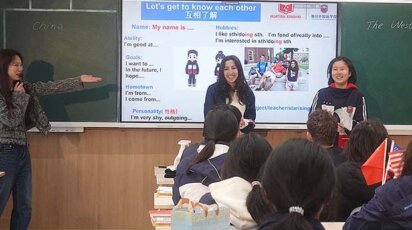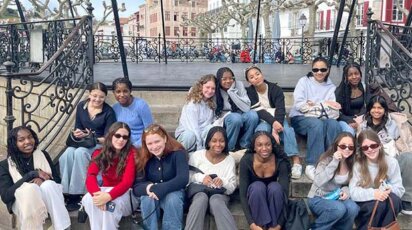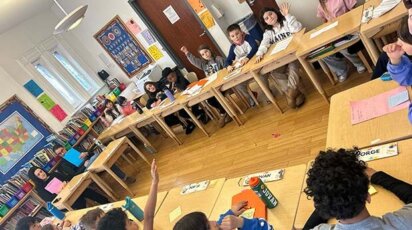News
Sustainability at Poly Teaches Hope for the Future
“In the end, we will conserve only what we love. We will love only what we understand. We will understand only what we are taught.”
– Baba Dioum, Senegalese Environmentalist and Engineer
Service Learning Teams (SLT)
Promoting a culture of service both inside and outside of Poly, Service Learning Teams (SLTs) provide a pathway where under the guidance of faculty advisors, Upper School students can think critically about the contemporary issues and challenges our local or global community face, expand their knowledge, and practice taking action with a solutions-oriented mindset. In Upper School, there is an expectation that every student participates in service learning, requiring a minimum hours of service for graduation, completed through school coursework or independently after school and/or on the weekends. Flexibility is important to the program in order to create more paths that consider students’ other commitments and accommodate their interests in different topics–it’s all about finding the right balance so that service learning can become an adapted practice and part of life.
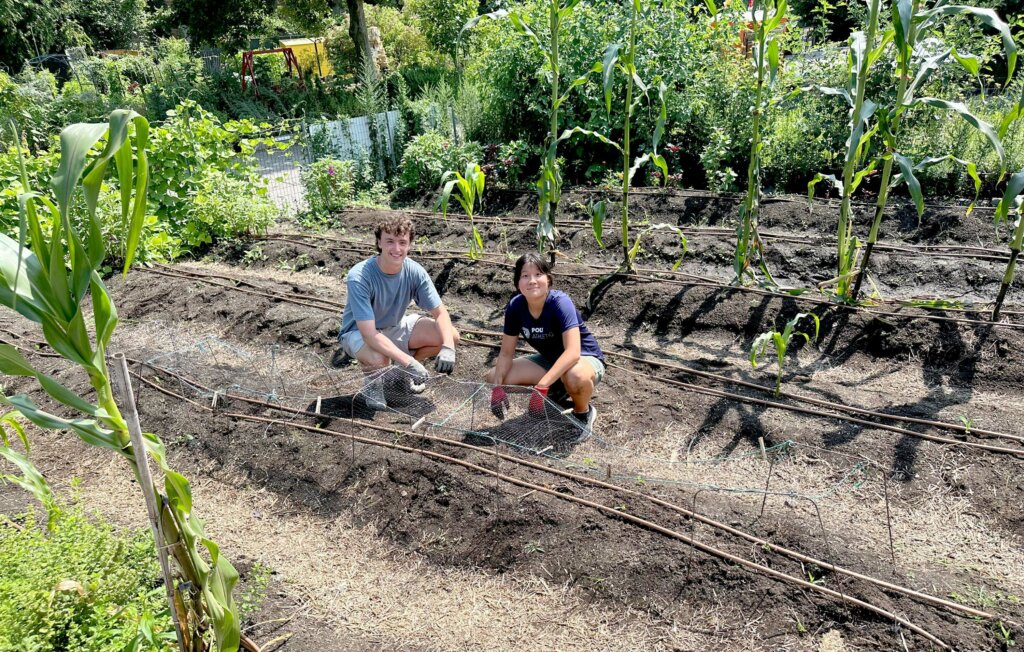
Beginning in 2011, there was an inaugural meeting of local service learning directors to address the common message and misconception sent to kids that the world is divided into people who need help and people who are able to provide help, producing events that are structurally ineffective and that reinforce harmful stereotypes (think: bake sale).
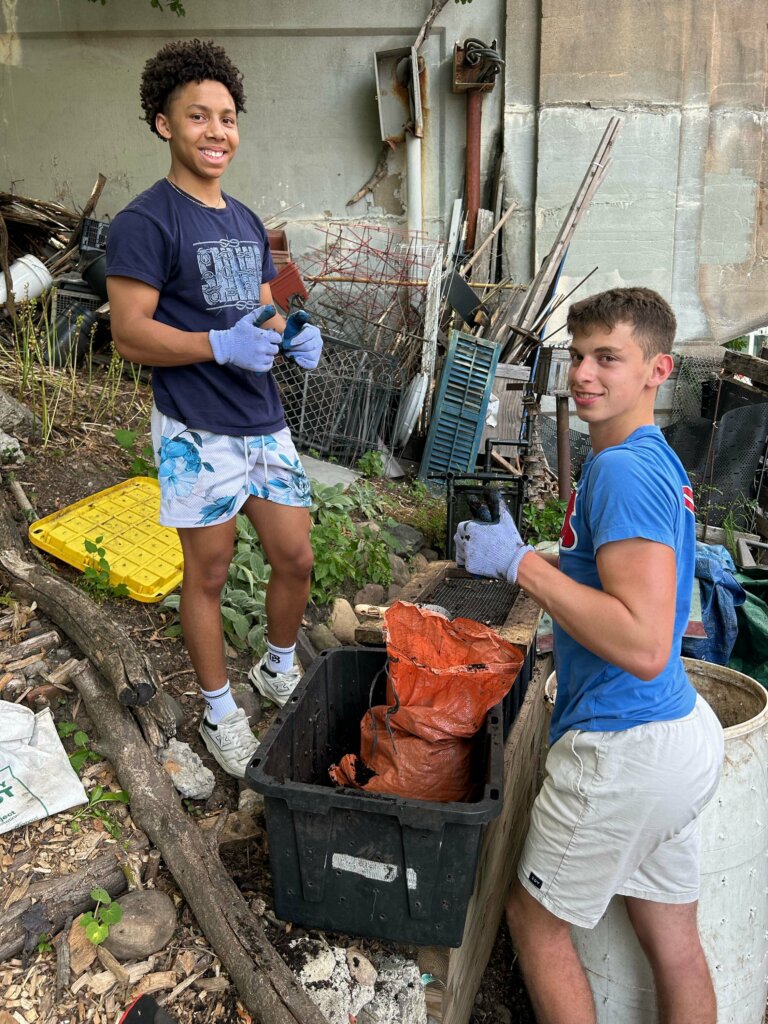
SLTs, some beginning as ideas presented by students to Director of Service Learning and History teacher Elijah Sivin, have ranged widely in their topics of focus, from elevating minoritized voices in the curriculum, to addressing misogyny, civics journalism with a focus on the upcoming election, sustainability practices, and many more. Due to the more flexible nature of summer break, summer SLTs provide a special opportunity to connect with local organizations that may require more substantial travel. In these hands-on experiences, students engage directly with local communities and the natural world, and in doing so, they gain a deeper understanding of contemporary social and environmental issues. The philosophy of the program is to be solutions-oriented: learning what the needs for change are and what actions Poly students can do to enact positive change towards it.
Summer SLT on Campus
In July, students came back to Dyker Heights for a week of immersion into the world of service learning and environmental activism, as part of Sivin’s annual summer SLT. Similar in structure to Science faculty member Clark Richter’s summer SLT on sustainability, the week opens with creative, place-based learning, continues with hands-on field work with local organizations, and ends with reflection and oral history presentations. The course’s structure inspires students to identify challenges within their reach and to create actionable plans to solve them. Derived from The Cloud Institute for Sustainability Education is the value of positive experiences and hope as a necessary component of sustainability work with students at Poly.
“It’s hard to express how much of an impact this sustainability program has had on me.
– Zoe Kim ’27
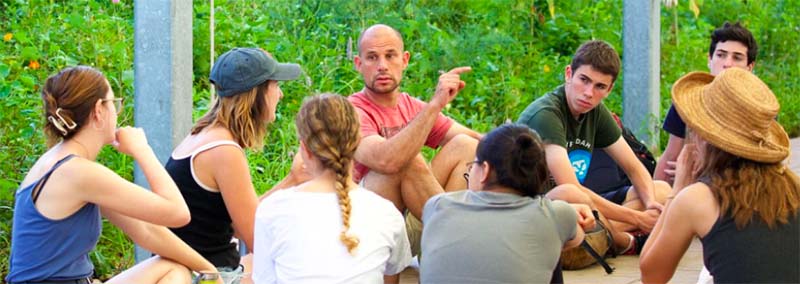
To begin the week of learning, students were encouraged to reflect on sustainability issues in a personal and optimistic way. They began with an exercise inspired by Sustainability Education Consultant Jamie Cloud, introduced to Sivin during a past professional development session. In this activity, students were asked to envision their lives 10, 20, or 30 years into the future, grounding the session in their individual dreams.
They answered with their hopes to travel, to take care of their parents, to have families, and more. Sivin shared that in respect to sustainability, when people consider their own personal futures, it is more likely that they see the future optimistically, with pessimism being more likely when people consider our collective future as a country, society or planet. The goal of Cloud’s exercise is to extend hope and empathy toward our shared futures so that all of our dreams can come to fruition, free from the limitations of the environmental and systemic inequities we currently face.
Partnership with One Love Community Fridge
One of the organizations that partnered with the summer’s SLT was One Love Community Fridge in Brooklyn, New York. Poly first began a partnership with the organization during the height of the COVID-19 pandemic as Poly community members participated in school events which provided donations to the organization’s local community fridges in Brooklyn. Following a ‘take what you need, leave what you can’ philosophy, community fridges are a key part of mutual aid projects—outdoor refrigerators where food is freely shared and accessible to all. This summer, Poly students partnered with One Love Community Fridge to contribute handmade goods. They prepared cold-cut turkey and cheese sandwiches, as well as vegetarian options, in One Love’s newly opened community space and stocked the nearby community fridges. One of the goals of community-focused work with students is to do meaningful work in a practical way and at the same time creates a foundation for community work to be continuous.
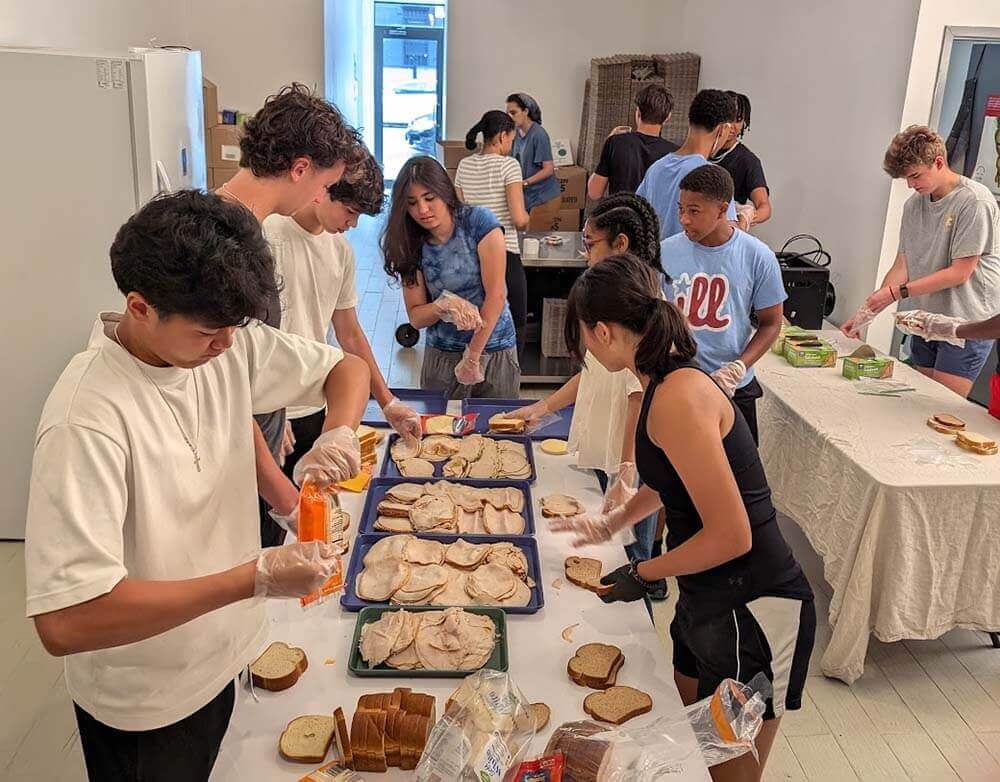
Being Action-Minded for Positive Change
In respect to Cloud’s exercise of envisioning our personal future, Siven said, “We need good systems so that we each can have the dreams we’ve imagined come true. How do we do that?” He encouraged students to be action-minded, to find ways to add their voices, and to join others in their advocacy work—to think within the realities of climate change, where we can make changes in our daily lives to have a more positive impact.
During the school year, SLTs take place over eight weeks, meeting an average of twice a week, while in the summer, they are condensed into a one-week intensive program. In the spring, SLTs are typically designed to address a seasonal trend of “spring cleaning.” While many people are discarding materials they no longer need, Poly’s spring SLTs host events to collect resources like books, clothing, technology, and more, and donate them to organizations who can repurpose the materials and reduce waste.“ You may not be able to create immediate change in coal mining but you can make a difference in the institutions around you, including this school,” Sivin explained to the class.
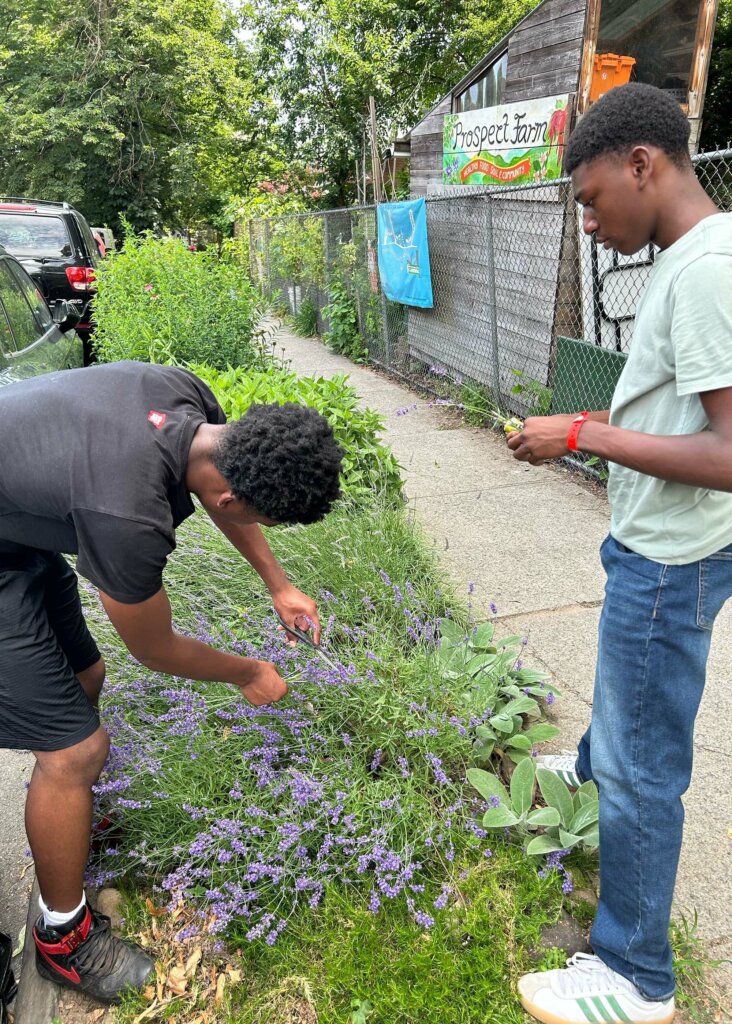
Social-Emotional Learning and Sustainability
Notably, social-emotional learning has its place in the SLTs as well. Throughout the course, students are offered resources to identify how they are feeling as new information related to climate change is presented. The class reads poetry such as Amanda Gorman’s Earth Rise and Prince Ea’s Three Second, offering them a creative avenue to further understand their perspective on the topic, as artists model activism from an often optimistic or community-focused perspective through their work.
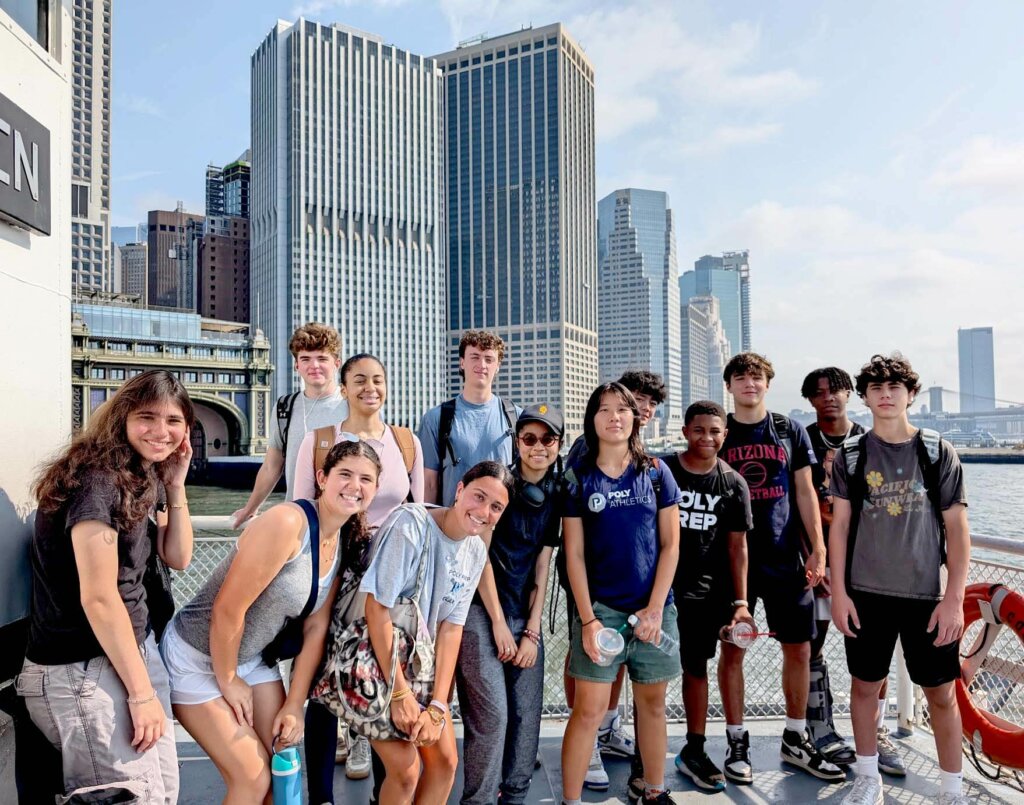
Art, psychology, and mental health play a big role in sustainability work at Poly. Together, they inspire new ideas for advocacy; they create urgency and maintain motivation, and encourage healthy habits that foster a deeper connection with the natural world. Sivin utilizes a balance of art, a presence of social-emotional engagement, goal setting, and nature walks to create a more holistic approach to sustainability.
He also shared parts of his personal story and connection to the environment with students, explaining his commitment to sustainability. “I came away with the understanding that ours is the only planet in the universe that we know sustains life and has done it for billions of years by balancing natural systems and cycles,” he said.
Faculty Professional Development
Each year, Sivin continues to develop the SLT program through professional development opportunities specific to environmental advocacy. This past spring, he attended a three-day conference by the Climate Reality Leadership Corps, where a wealth of information was presented. He was able to use what he learned as part of his own presentation to Poly students in the summer SLT. The information was divided into three categories:
- “Must we change” presented factual information about climate change and the environment.
- “Can we change” offered scientist and research-based solutions to address the issues caused by climate change such as extreme weather conditions, high rates of death and destruction both physical and economic, and predicted worsening outcomes.
- “Will we change?” which advocates involvement.
Summer learning isn’t just for his students. Sivin keeps himself up to date with the latest in environmental education and activist circles through summer professional development sessions on experiential learning, such as with the Gilder Lehrman Institute of American History, namely Kenneth Jackson’s “Empire City: New York and the Transformation of American Life, 1877-” and “Forever Wild: The Adirondacks in the Gilded Age and Progressive Era,” both of which highlight the advantages of getting out of the classroom and into the world.
“It’s important that students have a wide range of experiences where they can relate to something they’ve done, a place they’ve been, or topical conversations they’ve had with different people in order to create deeper resonance and meaning around the work. Summer is the opportunity where they can more easily achieve this,” Sivin reflected.
Student SLT Testimonials
“Helping and being involved with various sustainability organizations has sparked an interest in sustainability that I never knew I had,” said Zoe Kim ’27. “With ample free time this summer, I’ve been contemplating what I want to focus on for the remainder of my high school career, and possibly what I’d be interested in pursuing later on. While I still don’t have a definitive answer, sustainability has captured my attention and piqued my curiosity. This week’s experiences have encouraged me to explore the various opportunities in sustainability during the school year and next summer. It’s hard to express how much of an impact this sustainability program has had on me.”
“This experience genuinely impacted me, and I recommend [SLTs] to other Poly students. It’s a way for someone to develop a sense of purpose,” said Ocean DeGraff ’25. “After separating clam shells from oyster shells or throwing trash from the oyster shell pile, I felt happiness because it was empathetic. We are helping millions of oysters with recycled shells to build new reefs so that they can grow. This is one small example of why I recommend the service learning opportunities. Having empathy feels good.”
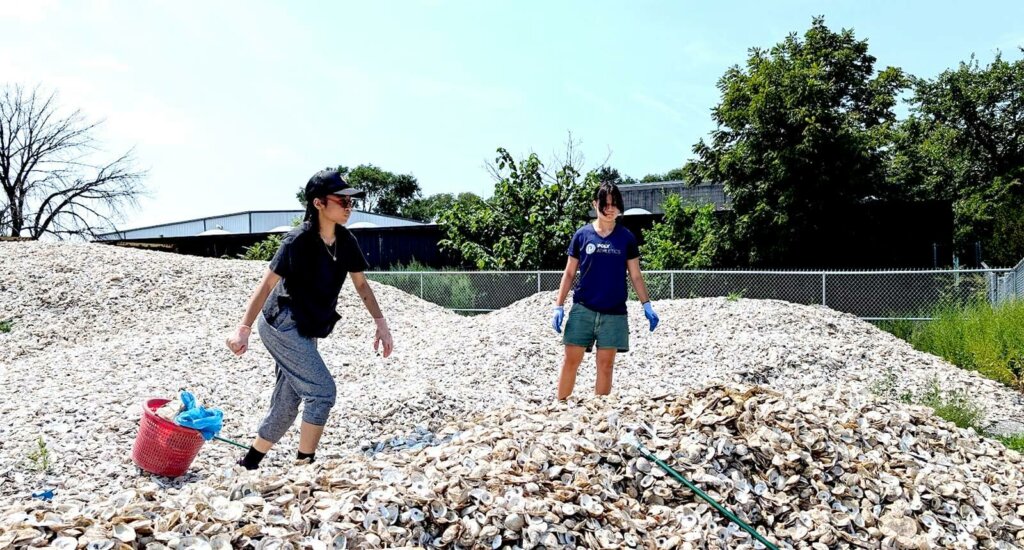
“This week changed my perspective and opinions of climate change and sustainability in general. I used to be extremely frustrated when thinking about the future of our planet, knowing that with our government and our society, it is very difficult to make substantial progress… When I got to experience the hands-on work that people are dedicating their time and energy to just to hopefully inspire others and get the scale of change to grow, it gave me that very hope and inspired me.,” said Emma Gordon-MooPenn ’27. “I may not necessarily want to pursue a career path [in environmental sustainability], but I do want to make some positive change by helping my community take initiative…”

